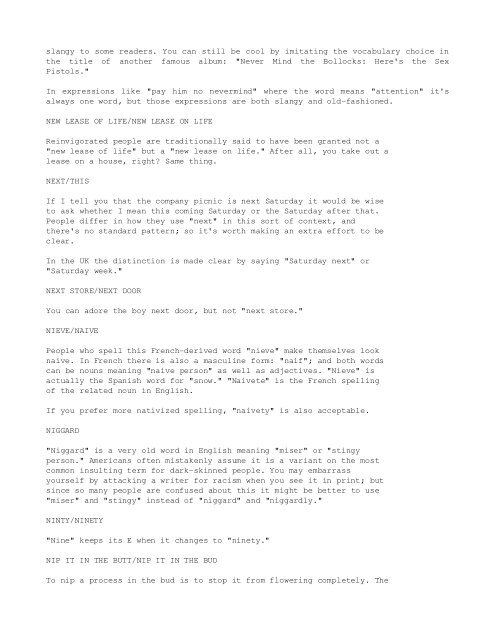Common_Errors_in_English_usage
Common_Errors_in_English_usage
Common_Errors_in_English_usage
Create successful ePaper yourself
Turn your PDF publications into a flip-book with our unique Google optimized e-Paper software.
slangy to some readers. You can still be cool by imitat<strong>in</strong>g the vocabulary choice <strong>in</strong><br />
the title of another famous album: "Never M<strong>in</strong>d the Bollocks: Here's the Sex<br />
Pistols."<br />
In expressions like "pay him no neverm<strong>in</strong>d" where the word means "attention" it's<br />
always one word, but those expressions are both slangy and oldfashioned.<br />
NEW LEASE OF LIFE/NEW LEASE ON LIFE<br />
Re<strong>in</strong>vigorated people are traditionally said to have been granted not a<br />
"new lease of life" but a "new lease on life." After all, you take out a<br />
lease on a house, right? Same th<strong>in</strong>g.<br />
NEXT/THIS<br />
If I tell you that the company picnic is next Saturday it would be wise<br />
to ask whether I mean this com<strong>in</strong>g Saturday or the Saturday after that.<br />
People differ <strong>in</strong> how they use "next" <strong>in</strong> this sort of context, and<br />
there's no standard pattern; so it's worth mak<strong>in</strong>g an extra effort to be<br />
clear.<br />
In the UK the dist<strong>in</strong>ction is made clear by say<strong>in</strong>g "Saturday next" or<br />
"Saturday week."<br />
NEXT STORE/NEXT DOOR<br />
You can adore the boy next door, but not "next store."<br />
NIEVE/NAIVE<br />
People who spell this Frenchderived word "nieve" make themselves look<br />
naive. In French there is also a mascul<strong>in</strong>e form: "naif"; and both words<br />
can be nouns mean<strong>in</strong>g "naive person" as well as adjectives. "Nieve" is<br />
actually the Spanish word for "snow." "Naivete" is the French spell<strong>in</strong>g<br />
of the related noun <strong>in</strong> <strong>English</strong>.<br />
If you prefer more nativized spell<strong>in</strong>g, "naivety" is also acceptable.<br />
NIGGARD<br />
"Niggard" is a very old word <strong>in</strong> <strong>English</strong> mean<strong>in</strong>g "miser" or "st<strong>in</strong>gy<br />
person." Americans often mistakenly assume it is a variant on the most<br />
common <strong>in</strong>sult<strong>in</strong>g term for darksk<strong>in</strong>ned people. You may embarrass<br />
yourself by attack<strong>in</strong>g a writer for racism when you see it <strong>in</strong> pr<strong>in</strong>t; but<br />
s<strong>in</strong>ce so many people are confused about this it might be better to use<br />
"miser" and "st<strong>in</strong>gy" <strong>in</strong>stead of "niggard" and "niggardly."<br />
NINTY/NINETY<br />
"N<strong>in</strong>e" keeps its E when it changes to "n<strong>in</strong>ety."<br />
NIP IT IN THE BUTT/NIP IT IN THE BUD<br />
To nip a process <strong>in</strong> the bud is to stop it from flower<strong>in</strong>g completely. The





